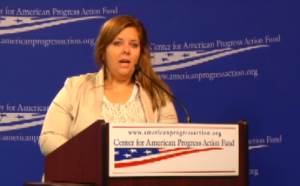–by Rae Tamblyn, Research Assistant–
Earlier this week I took a break from my usual duties to attend the Half in Ten Annual Report release. With a pumpkin bagel and a cup of coffee in hand, I settled in my chair to listen to some inspiring speakers discuss the poverty debate and how to renew our commitment to shared prosperity. Neera Tanden, President of the Center for American Progress, opened the event and introduced Chelsey Hagy.

Chelsey shared her personal story of how she was able to turn her life around after enrolling herself and her children, one of whom has special needs, in various federal support programs like SNAP and WIC.
As moving as Chelsey’s story was, what really stood out to me were some remarks by the keynote speaker, Secretary of Labor Thomas Perez, and by Eric Stegman of Half in Ten. The Half in Ten report notes that the job growth is slow and not widely felt, and that women and communities of color are disproportionately left behind in the progress the economy has made. It also underlines the fact that the single biggest ticket out of poverty is a good job.
After laying out key findings from the Annual Report, Mr. Stegman noted, “When the economy fails, the safety nets take the huge burden of intervening in the race to the bottom.” Since I work closely with the CSBG IS Survey data, I was immediately reminded how CAAs across the nation are working to reduce barriers to employment, ranging from direct actions such as certification courses, and training programs, to less clear-cut strategies to reduce the more intractable barriers to a good job, like a lack of affordable and safe childcare, transportation, or housing. Social safety sources of support such as HeadStart, Medicare, Medicaid, LIHEAP, and yes, CSBG, are investments in human capital.
Tom Perez, the Secretary of Labor, applauded the efforts to invest, build, and implement the social safety nets available to the most vulnerable populations, stating, “These provisions lift up the nation as a collective by helping the individual.” I was again struck by how well this aligns with our data. The numbers of individuals and families touched by our work reflect this, since the CSBG network alone addressed 32.5 million conditions of poverty last year.
As the echoes of the recession continue to reverberate through vulnerable communities, I believe we can point to our work and say “America, we met your need in times of such austerity. Invest in us, and we can help you lift yourself up, not just support you and keep you from falling further.”





